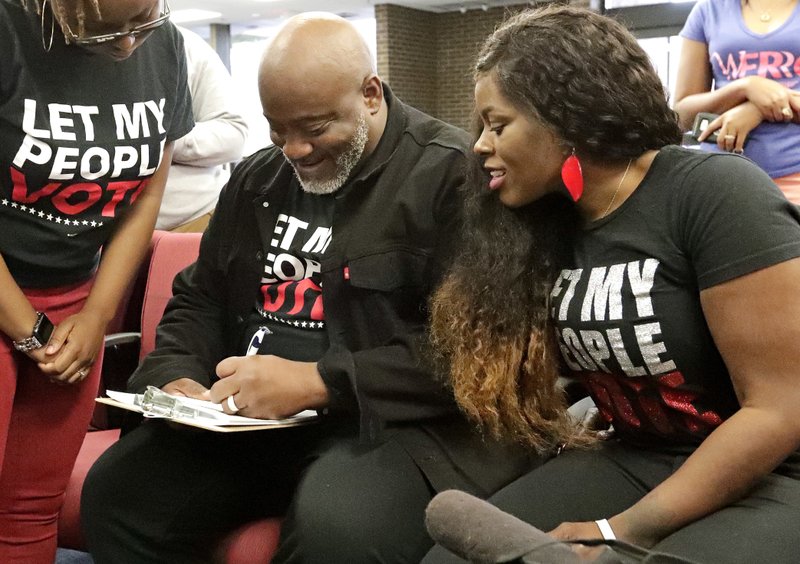TALLAHASSEE, Fla. -- Florida cannot, for now, bar felons who served their time from registering to vote because they have failed to pay all fines and fees stemming from their cases, a federal appeals court ruled Wednesday.
A three-judge panel of the 11th U.S. Circuit Court of Appeals upheld the preliminary injunction of a Tallahassee federal judge, who found that a state law implementing the state's Amendment 4 amounted to an unfair poll tax that would disenfranchise many of the released felons.
"We disagree with the ruling," said Helen Ferre, chief spokeswoman for Republican Gov. Ron DeSantis. She said the state would immediately ask the entire 11th Circuit to reconsider.
The case is one of several now before judges in the high-stakes legal skirmishes over Florida elections, which have drawn national scrutiny because of the state's perennial status as a political battleground and the razor-thin margins deciding some high-profile contests.
Amendment 4 was approved overwhelmingly by voters in 2018 to allow most felons who served their time to regain the right to vote. But soon after, the Republican-led Legislature passed legislation stipulating that the felons must pay any fines and fees before their sentences could be deemed complete under the law.
Voting-rights groups representing 17 plaintiffs sued in federal court, seeking to overturn the law.
In its ruling Wednesday, the circuit court said the financial requirement "punishes those who cannot pay more harshly than those who can -- and does so by continuing to deny them access to the ballot box."
The court added that previous U.S. Supreme Court rulings required it to "apply heightened scrutiny in asking whether the requirement violates the Equal Protection Clause of the Fourteenth Amendment as applied to these plaintiffs."
The appeals court ruled that it does, affirming the preliminary injunction issued last year by a federal district judge in Tallahassee.
Florida officials had hoped to win a stay of the preliminary injunction issued in October by U.S. District Judge Robert Hinkle, who called Florida's voter registration process in the wake of Amendment 4 an "administrative mess."
While Hinkle said Florida has the right to deny felons access to the ballot box if they have the means to repay outstanding financial obligations, he said Florida officials cannot deny the vote to felons who are too poor to fully settle up.
The preliminary injunction allowed the felons to register to vote, regardless of their ability to pay fines, restitution and other fees. It was issued ahead of a full trial that is scheduled to begin in April.
Wednesday's appellate court ruling came a day after the registration deadline for Florida's March 17 presidential preference primary.
While the ruling only applies to the plaintiffs, the case has broad ramifications for the 1.6 million Florida felons who have completed their prison sentences and could regain their voting privileges under Amendment 4.
According to a study by a University of Florida political scientist, about 80% of released felons still have legal financial obligations.
"Today's decision protects against Florida's efforts to crassly undermine the historic citizen-led voter initiative that restored voting eligibility to more than 1.4 million individuals," Leah Aden, deputy director of litigation for the NAACP Legal Defense Fund, said Wednesday. "By affirming a preliminary finding that predicated the ability to vote based on wealth is unconstitutional -- particularly when black people with felony convictions disproportionately lack access to wealth -- we are able to continue our fight to ensure that ultimately all Floridians whose voting rights were rightfully restored through Amendment 4 can exercise that right."
A Section on 02/20/2020
